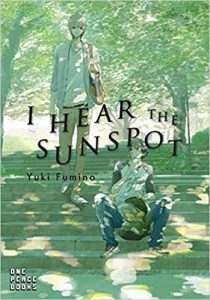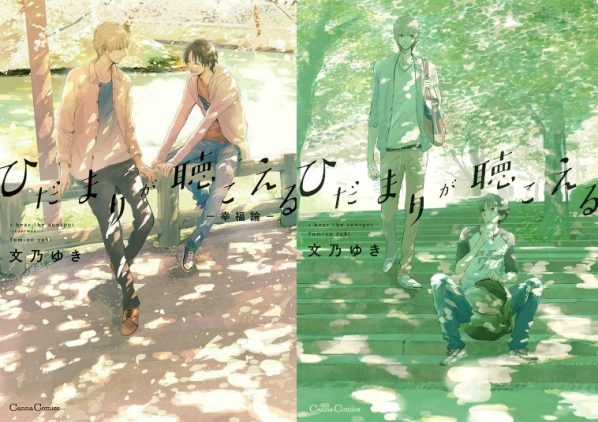 Title: I Hear the Sunspot Vol. 1
Title: I Hear the Sunspot Vol. 1
Author: Yuki Fumino
Publisher: One Peace Books
Language: English
Format: Paperback
Pages: 200
Genre: Slice of Life, Shonen Ai
Publication Date: August 15, 2017
The Story
The story of I Hear the Sunspot (Hidamari ga Kikoeru) revolves around Kohei Sugawara, a student that has a hearing disability. One day, after not being able to land a job, Taichi Sagawa leans on a fence which breaks, causing him to fall onto a roof where Kohei was eating lunch. Kohei offers Taichi his food Taichi accepts. Feeling bad about taking his food, Taichi returns the lunch box to him the next day and learns about his hearing disability. He decides to become Kohei’s note taker in exchange for free lunches. A friendship between the two starts to grow and, over time, ends up becoming something deeper.
I Hear the Sunspot’s story is pretty straightforward, yet, there are a few deeper layers to explore. It’s more than just a deepening friendship between two people. It also explores the acceptance of others with disabilities in society, but does so from the point of view of someone who is disabled. It explores Kohei’s inner thoughts and his perception of the world around him and how certain events have caused him to become severely introverted. It also explores the concept of trust and the fear that comes along with it.
While the story does seem to go from point to point, the overall emotions that are brought forth by the characters help keep the story diverse and interesting. The usage of inner monologues is a great storytelling tool because it allows the reader to dig deeper into a character’s mind and through it, you get a sense of character development and story progression at the same time. A lot of series often gloss over this aspect of storytelling which is a shame because it can add so many different layers. I’m glad Yuki Fumino decided to utilize it for I Hear the Sunspot.
Characters
While there are only a handful of characters, I Hear the Sunspot focused on Kohei and Taichi the most while relegating the other supporting characters to the background or to borderline obscurity. While this is usually a negative in most series, it actually works well here because of the way the story is written. It’s almost as if the background characters are not really needed all that much.
Taichi and Kohei have very conflicting personalities that actually mesh very well together. Taichi is very energetic and loud-mouthed. He’s very eager to do almost anything for a free meal, but it’s not because he’s cheap, it’s because he’s poor. His parents divorced and remarried so he was sent to live with his grandfather who had little to no money. Taichi is also a bit quick tempered and it caused him to lose his job and build a bit of a negative reputation in and around the area he worked. Despite this, he was quick to latch onto Kohei and you could see the effects of his infectious personality almost immediately. Taichi does seem like a good friend-type character, albeit, a bit of an annoying one, but you can definitely see his good intentions throughout the volume.
Kohei is the direct opposite. He’s pretty anti-social and hard to get along with. Kohei brings all of this upon himself due to his perception of the world around him. After getting a fever, he experienced sudden hearing loss. While he isn’t completely deaf, he still found it difficult to live in a world made for those who can hear. Some classmates seemed friendly while others would often make typical remarks about his inability to hear. Slowly, over time, this caused Kohei to shut himself off from the rest of the world, feeling he would be better off if he didn’t get involved with anyone. Of course, that all changed the day Taichi fell out of the sky.
Whether it’s Kohei or Taichi, both characters have a relatable personality that is easy to understand and sympathize with. Yuki Fumiko does a great job detailing their backgrounds and gives you reasons to actually care about them. Neither of their backstories are far-fetched and they are the kind of stories that can be transferred to so many different aspects of people’s lives. It’s because of this that supporting characters can take a back seat and be brought in only when needed. The main characters are just written so well that it’s not like the attention is being forced on them, but more like they deserve the attention that they are getting.
Final Thoughts
While this series may be a bit off-putting for some due to the Shonen Ai (Boys Love) tag, I wouldn’t judge it on that tag alone. Any Shonen Ai activity was kept to a minimum and the volume, instead, spends most of its time focusing on life from both of the main character’s perspectives all while forming a bond of friendship between them.
In fact, I’m going to state that this was one of the better slice-of-life stories that I’ve read. Sometimes a slice-of-life story will run into pacing issues or the story just isn’t interesting, but I Hear the Sunspot has neither of those issues. Everything moves along at a good pace, everything connects and flows into one another seamlessly and the story itself grabs and holds onto your attention. The character development alone is worth the time investment because you really do get that sense of connection.
So far, I Hear the Sunspot is a great series and I’m very much looking forward to volume two!
Be sure to follow me on Twitter @TheAnimePulse
You can also check out other The Outerhaven reviews on your favorite social media networks:
Subscribe to us on Twitter: https://twitter.com/theouterhaven
Subscribe to us on Facebook: https://www.facebook.com/TheOuterHaven
Subscribe to us on Youtube: http://www.youtube.com/theouterhavennet
A digital version was provided for review by One Peace Books


